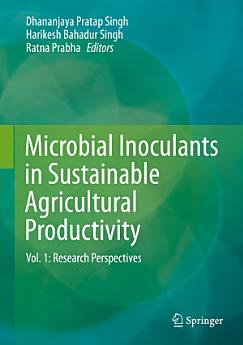Microbial Inoculants in Sustainable Agricultural Productivity: Vol. 1: Research Perspectives
اس ای بک کے بارے میں
The first volume of the book Microbial Inoculants in Sustainable Agricultural Productivity - Research Perspectives highlights the efforts of global experts with regard to various aspects of microbial inoculants. Emphasis is placed on recent advances in microbiological techniques for the isolation, characterization, identification and evaluation of functional properties using biochemical and molecular tools. The taxonomic characterization of agriculturally important microorganisms is documented, along with their applications in field conditions.
The book exploresthe identification, characterization and diversity analysis of endophytic microorganisms
in various crops including legumes/ non-legumes, as well as the assessment of their beneficial impacts in the context of promotingplant growth. Moreover, it provides essential updates onthe diversity and role of plant growth promoting rhizobacteria (PGPR) and arbuscular mycorrhizal mycorrhizal fungi (AMF). Further chaptersexamine in detailbiopesticides, thehigh-density cultivation of bioinoculants in submerged culture, seed biopriming strategies for abiotic and biotic stress tolerance, andPGPR as abio-control agent. Given its content,the book offers a valuable resource for researchers involved in research and development concerningPGPR, biopesticides and microbial inoculants.مصنف کے بارے میں
Dhananjaya P. Singh is presently Senior Scientist (Biotechnology) with ICAR-National Bureau of Agriculturally Important Microorganisms, Indian Council of Agricultural Research, India at Maunath Bhanjan, India. He did his Masters degree from G.B. Pant University of Agriculture & Technology, Pantnagar, India and Ph. D. in Biotechnology from Banaras Hindu University, India. His research interests lies in bioprospecting of metabolites, microbe-mediated stress management in plants, metabolomics-driven search for small molecules and bioinformatics. He has been engaged with the development of supercomputational infrastructure for agricultural bioinformatics at ICAR-NBAIM under National Agricultural Bioinformatics Grid project of ICAR. He has overall 112 publications including 60 research papers, two edited books, 22 book chapters, 20 popular articles, 15 reviews and one Indian Patent to his credit.
Harikesh B. Singh is presently Professor & Head, Department of Mycology and Plant Pathology at Institute of Agricultural Sciences, Banaras Hindu University. He served the State Agriculture University, Central University and CSIR Institute in teaching, research and extension roles. His major research focus is on bioinnoc
ulats, biological control of plant pathogens and nano-biotechnology. In recognition of Prof. Singh’s scientific contributions and leadership in the field of plant pathology, he was honored with several prestigious awards, notable being CSIR Technology Prize for Biological Sciences, Vigyan Bharti Award, Prof. V.P. Bhide Memorial Award, Society for Plant Research, Scientist of Excellence Awards, BRSI Industrial Medal Award, Jyoti Sangam Award, Akshyavat Samman, Distinguish Scientist Award by Society for Research Development in Agriculture, Prof. Panchanan Maheshwari Medal by Indian Botanical Society, Rashtriya Gaurav Award by IIFS, Plant Pathology Leader Award by IPS, CSIR Award for S&T Innovation for Rural Development (CAIRD), Environment Conservation Award, Vigyan Ratna by UP Council of Science and Technology. Dr. Singh has been the Fellow of National Academy of Agricultural Sciences. Professor Singh has written two books, several training modules/ manuals and more than 275 publications and has more than 18 US patents and 3 PCTs to his credit.Ratna Prabha has obtained her Master's degree in Bioinformatics from Banasthali Vidyapeeth, Rajasthan and Doctorate in Biotechnology from Mewar University, India. She is presently associated with ICAR- National Bureau of Agriculturally Import
ant Microorganisms, India in Network Project for Agricultural Bioinformatics and Computational Biology of Indian Council of Agricultural Research. Dr Prabha has been engaged in developing various bioinformatics digital databases on plants and microbes, published 14 research papers in the journals of International repute and 06 book chapters. Her current research interest lies in microbe-mediated stress management in plants, database development, comparative microbial genome analysis, phylogenomics and pangenome analysis of prokaryotic genomes. She has completed several bioinformatics demonstration tasks at different National training programs on bioinformatics and computational biology.





